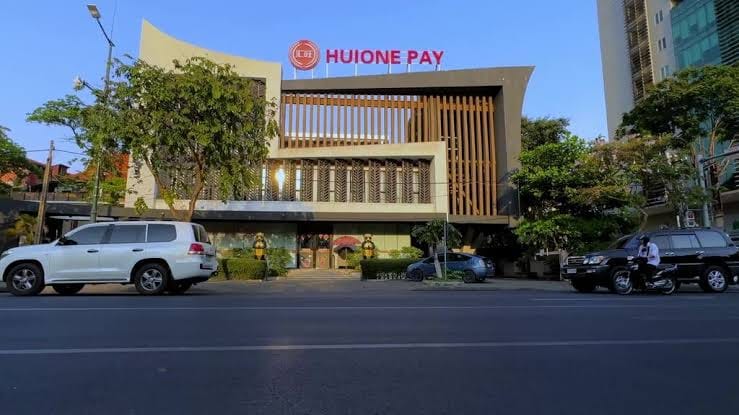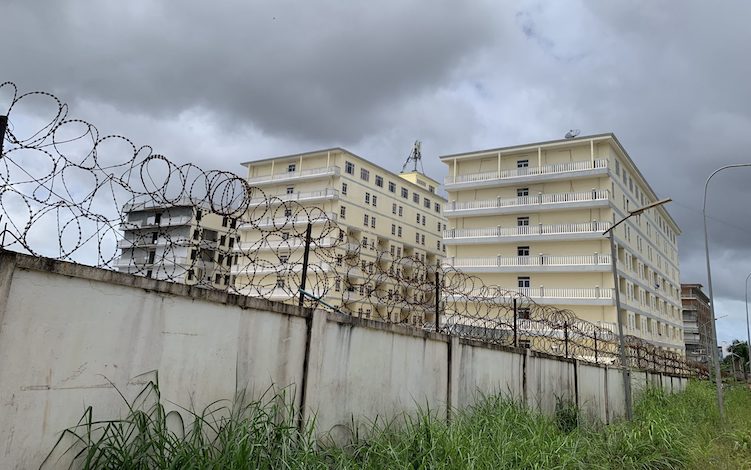Organised crime has seized a growing foothold in mainland Southeast Asia with scam centre compounds expanding dramatically in Cambodia, according to a new report.
The report by Jacob Sims, a crime and human trafficking researcher who is a visiting fellow at Harvard University’s Asia Center, says transnational fraud is “perhaps the most dominant economic activity in the entire Mekong subregion – equivalent to nearly half of total GDP (gross domestic product) in the primary host countries” – Cambodia, Myanmar and Laos.
Transnational organized cybercrime is now the world’s fastest growing and “most dangerous illegal industry,” he said, as criminal syndicates have been luring unsuspecting job seekers from over 70 countries and forcing them to work, alongside willing criminals, on sophisticated fraud schemes targeting people all around the world.
ALSO SEE: US Seen Easing Chip, Product Curbs to Get China’s Rare Earths
Sims’ report, launched at the Foreign Correspondents Club of Thailand last month, was based on over 50 interviews with diplomats, civil society leaders, academics and journalists, plus literature reviews.
It paints a damning picture of crime and corruption in Cambodia, saying scam compounds have sprung up in the capital Phnom Penh and most of its 24 provinces.
Scamming became enormously profitable after thousands of Chinese – pushed out their homeland by Beijing’s clampdown on gangsters or drawn to Cambodia’s citizenship scheme – fled after Hun Sen cracked down on online gambling in August 2019.
Covid led to ‘greater criminality’
But the Covid-19 lockdowns and economic contractions “supercharged” a transition to even greater criminality and increased the appeal of cyber scams and human trafficking, he said. Empty casinos owned by some of the country’s most powerful people were rapidly converted “into fortresses for industrialized, human-trafficking-fuelled scamming.”
And now, “with new compounds popping up constantly,” about 150,000 people are reported to be working in large-scale, sophisticated scamming operations – bringing in earnings well over the largest formal sector, the garment industry, he said, with estimates ranging from $12.5 billion to $19 billion a year, equivalent to 60% of GDP.
UNODC said the country had over 340 licensed or unlicensed casinos in 2022. Gambling was a high-volume, around-the-clock cash business that was unregulated. There was high-speed internet, adequate security and the gambling industry’s secondary banking system frequently served as a way to mix funds from different sources and make them difficult to track.
“Evidence of widespread human trafficking in the industry is legion: courageously relayed by survivors, painstakingly catalogued by local civil society, researched and reported in hundreds of local, regional and global media stories – and relentlessly denounced by Cambodian government spokespeople,” he said, noting that others had linked the industry to significant violence, such as kidnappings, shootouts and murders.
“Since 2022, the Kingdom has been the relentless subject of scrutiny and concern across the region and the world, as key bilateral partners face mounting security concerns related to the significant number of their citizens trapped in the compounds or the scam losses befalling their constituencies.”
‘Show crackdowns’
The government’s principal response, he said, had been described as “denial, repression and cover-up,” aided by the government’s “masterful ability to manipulate concerned international actors.”
In late 2022, the government staged “the most perfunctory round of raids” – “show crackdowns” on scamming compounds, which helped convince the Financial Action Task Force (FATF, an international watchdog) to refrain from listing Cambodia on its anti-money laundering grey list – a decision that many of his 51 sources said must be reconsidered.
And Sims says Cambodia continues to hide its law enforcement operations from journalists. The Global Organized Crime Index said in 2023, “the government has banned journalists from covering police investigations, which suggests that officials may be trying to hide their involvement in illicit markets.”
The most troubling aspect of his report, based on “virtually unanimous” feedback from the 51 people he interviewed, was that “reliable protection by the government and co-perpetration by party elites are the primary enablers of Cambodia’s trafficking-cybercrime nexus and pose the chief barriers to combating the industry’s explosive growth.”

Civil society ‘heavily repressed’
One of the difficulties in responding to the explosion of criminal activity is that Cambodia’s civil society networks – grassroots volunteer response networks, human rights groups and independent media – have been “heavily repressed” by the government, hit by USAID cuts and face physical risks, such that they are now “near the point of extinction,” Sims said.
One of the dozens of NGOs working in the country said because the government had an “absolute capture of the justice system” it was able to prosecute low-level brokers and the occasional token elite – but never the kingpins.
In January, blockchain analytics firm Elliptic said Huione Group, a Cambodian company with ties to the country’s elite, was “the largest online criminal marketplace in history.”
The digital forum, dedicated to online gambling and “money laundering services for scam industry practitioners,” reportedly had $24 billion in funds traced through Huione Guarantee over the past 3.5 years.
Shortly after a subsidiary firm, Huione Pay, had its Cambodian banking licence revoked, but Sims said no enforcement action had been taken against the firm or its executives.
Sims noted that the US Treasury had imposed sanctions on Ly Yong Phat, a Cambodian official known as the ‘King of Koh Kong’ province, but listed another 28 individuals on page 50 of his report which sources said may also warrant consideration for US government action.
‘It’s fabricated, baseless’
None of this impressed officials at Cambodia’s Ministry of Interior, who told CamboJA News last week that Sims’ report was “politically motivated and baseless”, “unprofessional and unsubstantiated” and lacking credible evidence.
“This is nothing new, and also no different from previous reports that the writers thought up and fabricated facts against their will and profession as the researchers,” it stated. “This report is ill-intended to serve a political agenda of the national and international extreme opposition syndicates.”
It denied that the Interior Minister or his family were involved or benefitted from Jinbel Casino, which Sims named as a scamming hub. A senior trafficking official also rejected the report, which said the government’s anti-trafficking efforts were simply “propaganda.”
Meanwhile, Cambodians and Thais have been distracted in recent days by a dispute over an undemarcated border area on their 817km frontier, after Thai officials discovered that Cambodian troops had moved into the area, known in Thailand as Chong Bok, in mid-April, where there are several Khmer ruins, and dug a long trench.
This led to a standoff and the fatal shooting of a Khmer soldier in late May, which caused both sides to move a large number of troops and armoured vehicles into the area, before leaders on each side agreed to retreat from their positions after Phnom Penh agreed to fill in the trench.
The Thai Army’s Supreme Commander said on Tuesday they were considering cutting cross-border power and internet links in an effort to suppress call-centre scam operations there.
And in the US on the same day, the US Justice Department said five men pleaded guilty to charges of helping to launder over $36.9 million stolen from victims of fake digital asset investment scams that operated out of centres in Cambodia.
They had tricked US victims contacted via social media, calls and dating apps into thinking they were investing in cryptocurrencies. The funds eventually went to leaders of scam centres in places like Sihanoukville, a Thai PBS news report said.
- Jim Pollard
ALSO SEE:
US Sanctions Karen Warlord, Cambodia ‘Money Laundering Group’
Cyber Scam Hubs Spread From Asia Like a Global Cancer: UN
Thousands in Limbo as Thailand Fights Scam Hubs on Two Fronts
Scam Centre’s Abduction of Chinese Actor a Blow For Thai Tourism
SE Asia Crime Networks Rely on Telegram, Crypto, UN Says
Weak ASEAN Nations ‘at Risk of Evolving Into Scamming States’
‘US to Sanction Prominent Cambodians Tied to Scam Centres’
N Korean Hackers Used Cambodian Firm to Launder Stolen Crypto
Cambo-Chinese Firm Tied to Crypto Scams, Money Laundering
Scamming Compounds in SE Asia Stole $64 Billion in 2023: Report
High-Tech Asian Crime Wave: Cyber Scams, Casinos Loot Billions
Big Tech ‘Doing Little’ to Counter Rampant Scams on Social Media
Crime Gangs Control Some Myanmar, Laos Economic Zones: UN
























